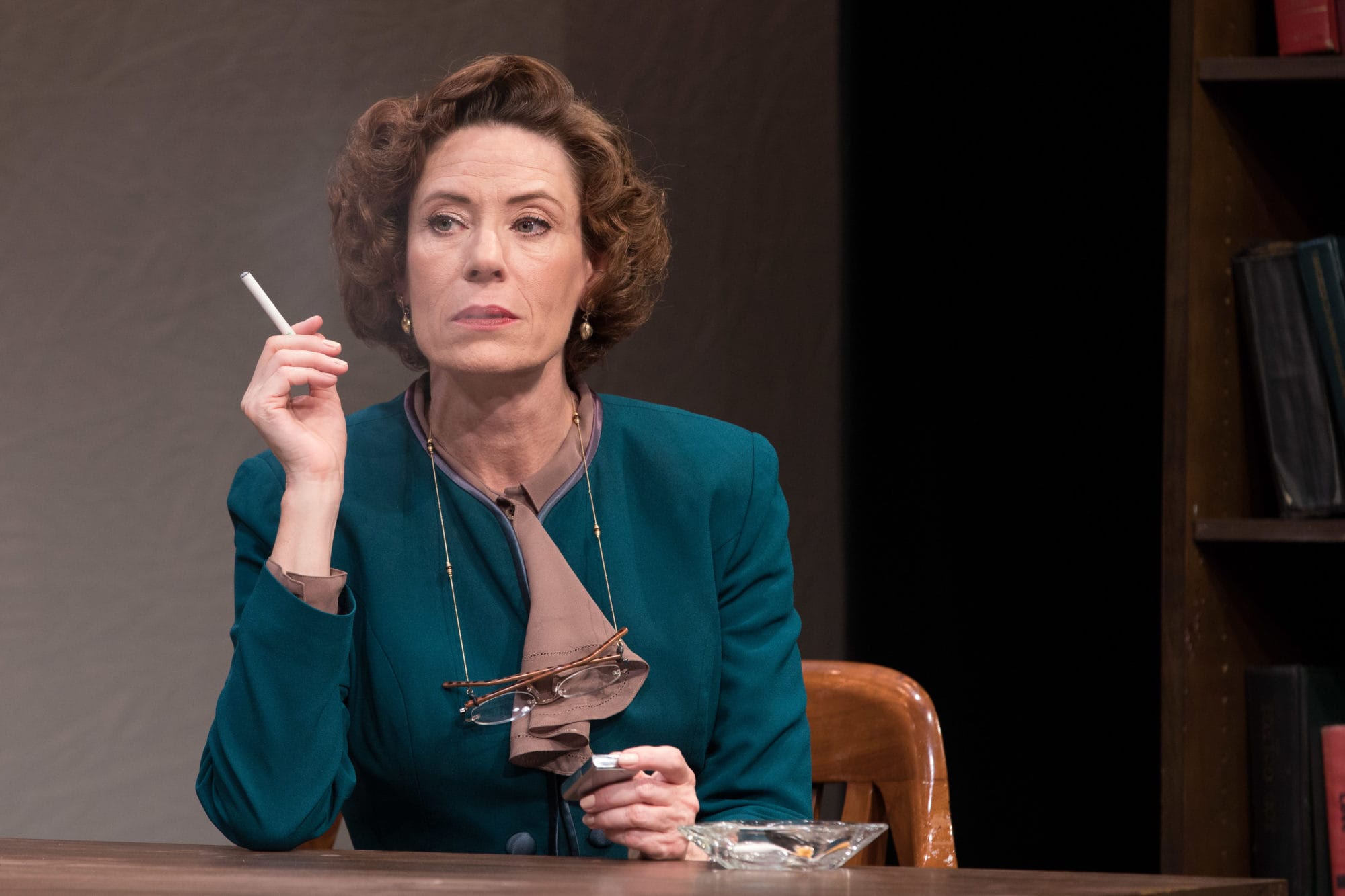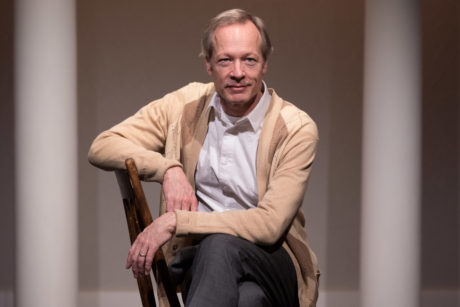“It is certain, in any case, that ignorance, allied with power, is the most ferocious enemy justice can have.” – James Baldwin
Southern humor, gentle charm, and the awkward silences of discussions about race—Alabama Story is a heartening reminder that, even during the terrible injustices of Jim Crow, some residents of the South exhibited character and compassion.

Written by Kenneth Jones, the play is based upon real-life events. In Montgomery, AL, state librarian Emily Wheelock Reed became involved in a battle with State Senator E.O. Eddins over a seemingly innocuous children’s book, The Rabbits’ Wedding. The author was the distinguished writer and illustrator Garth Williams, who provided artwork for such classics as the Little House on the Prairie stories and Stuart Little. The book is a lovely, innocent story about a black male rabbit who courts and marries a white female rabbit. It is still enjoyed by children today. Unfortunately, to the 1959 segregationists, it seemed to advocate race-mixing, which for them was utterly beyond the pale.
Senator Eddins and the White Citizens’ Council, a far-right white supremacist group, demanded that the book be banned. Ms. Reed refused. Rather than remove the book from all library agency collections, she placed it on reserve where it was available if requested by members of the public.
The war intensified, and Eddins (named E.W. Higgins in the play) actually said, “This book ought to be burned. There’s no room for any other opinion but ours, our enchanted Southern kingdom must be preserved.” Because of my own Southern background, I can understand these demented sentiments; for a non-Southerner, I expect they are hard to comprehend or even believe.
Nigel Reed, as Garth Williams, is by turns whimsical, scathingly witty, and rueful. Steven Carpenter as Senator E.W. Higgins is a magnificent barnstormer, whose heartfelt “Jesus wept!” convulses the audience. Even Higgins, in this beautifully balanced piece, has some claim on our empathy. A flood destroyed his favorite book, Tom Sawyer, when he was a child.
His antagonist and our heroine, Emily Wheelock Reed (Julie-Ann Elliott) is a woman of heart and conscience, self-confident, and exceptionally capable. Her expressions as she slowly realizes that Higgins is pressuring her to remove the book are wonderfully vivid. She stiffens as he questions why she is not married, marriage apparently being compulsory for Southern women in 1959. Our respect for her as a character grows as she handles the publicity over the row with cool aplomb.
Her assistant and self-proclaimed protector, Thomas Franklin (Christopher Herring), is a thoughtful young man, who takes his job extremely seriously, so seriously that he becomes even more alarmed than Ms. Reed when she receives death threats. Herring has some especially forceful moments as he relates the true story of another embattled Southern librarian, whose fate was much worse than Ms. Reed’s.

The Senator and the state librarian have some intriguing scenes together as they match wits. He is reminiscent of Matthew Harrison Brady (based on William Jennings Bryan) in Inherit the Wind: loud, effective, at least in his own mind, and in love with the sound of his own voice. To Higgins, anything outside of his narrow frame of reference is by definition a threat. Ironically, he too, like Ms. Reed, is a champion of books. However, one suspects that if Higgins had a woman of Ms. Reed’s intelligence at home, as daughter, sister, or even (horrors!) wife, he would run her out of the house immediately.
Ms. Reed is more unusual. She is highly intelligent, she does not suffer fools gladly, but has a sensitive side and is willing to acknowledge her own mistakes. She sees her post as top librarian in the state as a calling; she aims to provide books which will open people’s minds and allow them to educate themselves, or dream of lives and destinies very different from their own.
The story is set against the backdrop of Jim Crow, Rosa Parks, and the Montgomery bus boycott. At times the integration of libraries is mentioned, although it never becomes a central preoccupation. All the Southern characters, like many Southerners, seem obsessed with being Southern. This is not unusual, even today.
A parallel story features Lily Whitfield (Jenny Donovan), a well-to-do white girl who grew up in the “big house”. She is pure as snow, like Elsie Dinsmore, the saintly heroine of a mostly forgotten book series about life on Southern plantations. Lily, like Elsie, has chosen a conventional existence, married to the new president of her father’s business. She stays firmly in the limited realm her culture offers to women, and her brief attempt at rebellion is squashed before it even has a chance to start. Jenny Donovan gives a graceful performance full of subtle humor.
Joshua Moore (the excellent Gerrad Alex Taylor) was a childhood friend of Lily’s. Joshua, an African-American, lived with his mother, who was a servant in the big house. His pleasant chats with Lily are interrupted more than once by white men checking to see if she is “all right”. She becomes incensed with one of them and chases him away, screaming imprecations. Of course, her final words to him, in the true Southern tradition, are “Happy Thanksgiving to you and yours!” The two friends’ relationship, then and now, has possibilities neither will ever acknowledge. Joshua is visiting the Reverend Martin Luther King, Jr.’s church, and unlike Lily, has developed political interests and a larger perspective on the world.
The influence of Thornton Wilder’s Our Town is present everywhere; Garth Williams is our narrator, and he also plays multiple characters with great skill. The blending of real and fictional characters works well, and the play has unique resonance for today’s audiences. Emily’s actual words are quoted, “A librarian must be a repository of all sides of the question…I believe that the free flow of information is the best means to solve the problems of the South, the nation, and the world.” In the era of Fake News and unceasing attacks on journalism, Alabama Story not only touches on themes of censorship, integration, politics, and romance but reminds us of the importance of facing the truth.
My only caveat is that the Southern accents seemed to appear and disappear occasionally, but that is difficult to avoid. The quality of the acting was such that I hardly noticed.
Costumes, by Stacey Thomann Hamilton, suggest character in amusing, quirky ways. Emily wears conservative clothes with a touch of drama; a bright pink sweater with a brown plaid skirt, implying, “I am not just a librarian: I am a high-spirited woman.” Thomas wears a marvelous bow tie and shirt combination, which suits his geek-like character perfectly.
The set design, by Jingwei Dai and Kirk Kristlibas, consists of Ms. Reed’s office, full of books, with the standard file box, pencil holder, old-fashioned telephone, and a temperamental old radio. There is the bench where Joshua and Lily meet. Other settings are created by the clever lighting design by Marianne Meadows, which focuses the audience’s attention. Sound, by Frank DiSalvo, Jr., is as equally nuanced as the rest of the production. There is rain, banjo music, guitar, and the soft, purring sound of Southern crickets.
Director Kasi Campbell’s Alabama Story is a captivating and thought-provoking production. Enjoy!
Running Time: Two hours and 20 minutes, including one 15-minute intermission.
Alabama Story plays through April 22, 2018, at the Undercroft Theatre – 900 Massachusetts Ave NW, in Washington, DC. For tickets, you can buy them at the door, or purchase them online.





Strong review. Wish that there was more about the playwright (YOU) than just the first sentence. But I’m glad that it’s being done in so many places!
\